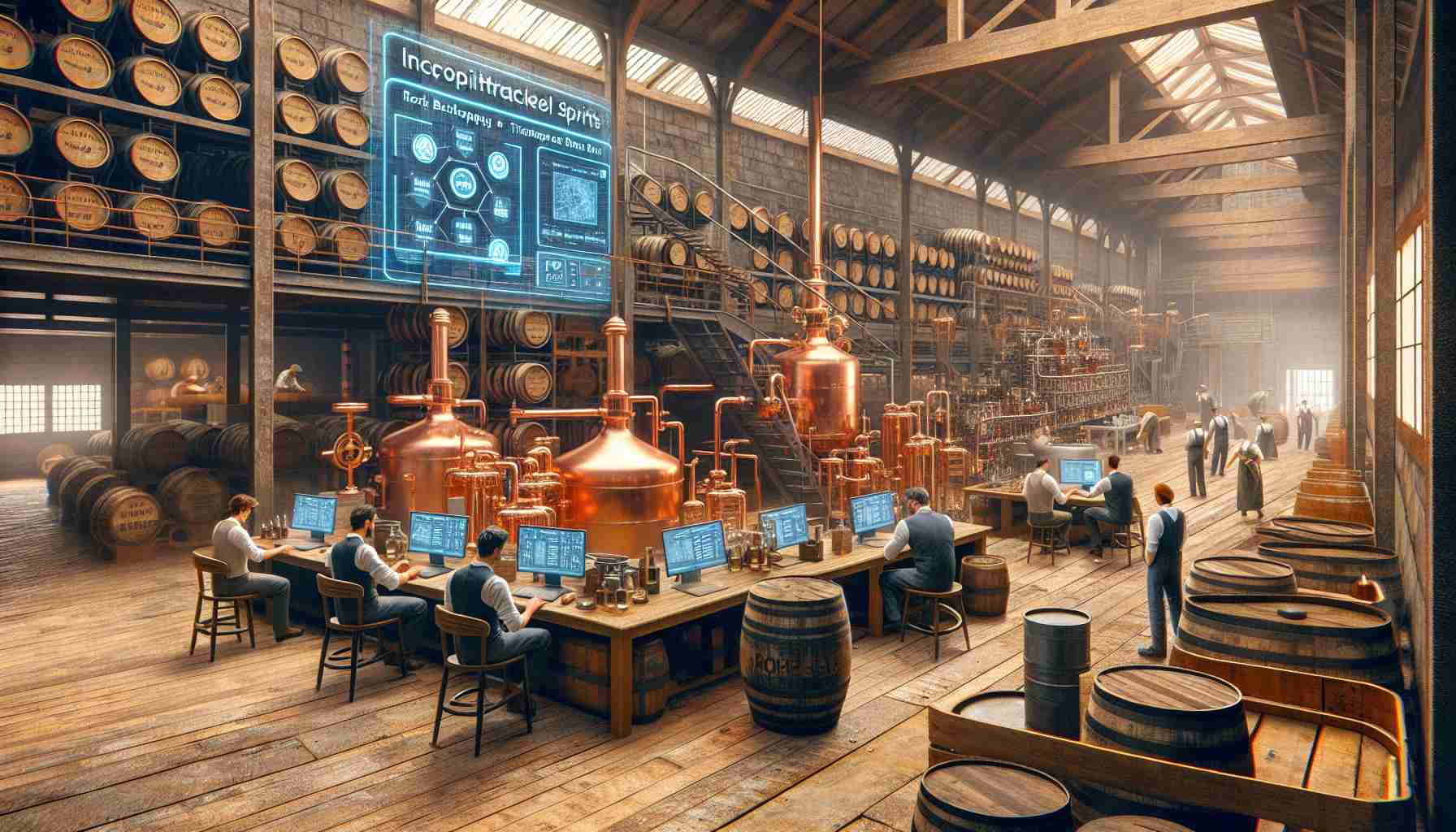Roehill Springs Distillery, a family-run gin distillery near Keith, Moray, has taken a bold step towards transparency in its production process. Utilizing blockchain technology, the distillery aims to provide customers with complete clarity on the water used in their award-winning spirits.
In collaboration with CENSIS, Scotland’s innovation center for sensing and IoT technologies, and app developer TrackGenesis, Roehill Springs has become one of the first companies to directly integrate sensor data with a blockchain. By implementing this system, the distillery ensures the traceability and quality of its ingredients while guaranteeing environmental responsibility.
As part of the CENSIS IoT Evolve program, supported by the Scottish Government and Highlands and Islands Enterprise, Roehill Springs has installed IoT sensor-based flow meters at its spring and distillery locations. These meters collect data on the water usage, which is then sent to a smartphone and tablet application via Bluetooth. The information is stored on a private blockchain, accessible to customers through a QR code printed on each bottle of Roehill Springs gin.
This innovative approach not only provides customers with accurate information on the origins of their spirits but also enhances the authenticity of the data. The tamper-proof and immutable nature of the blockchain ensures the reliability and security of the information. Additionally, the system eliminates the time, errors, and costs associated with manual data entry.
Duncan Morrison, co-owner of Roehill Springs Distillery, emphasizes the importance of transparency and sustainability in their operations. While the initial focus is on tracking water usage, the distillery plans to explore other applications of blockchain technology, such as energy monitoring, to further enhance their transparency efforts.
Ally Longmuir, business development manager at CENSIS, praises the project as an excellent example of utilizing sensor data and blockchain technology to increase transparency and efficiency in business operations. They hope that Roehill Springs’ success will inspire other businesses to explore the potential uses of these technologies.
Richard Lochhead, the Scottish government minister for small business, innovation, tourism, and trade, lauds this innovative venture, highlighting the significance of embracing technology to drive economic transformation and sustainability.
Roehill Springs Distillery’s adoption of blockchain technology demonstrates a new era in the spirits industry. By prioritizing transparency and traceability, they set an example for others in the field, forging a path towards a fair, green, and sustainably growing economy. With customers demanding more accountability from brands, Roehill Springs is leading the way in meeting these expectations and fostering a stronger connection between consumers and the products they consume.
An FAQ Section based on the main topics and information presented in the article:
Q: What is Roehill Springs Distillery?
A: Roehill Springs Distillery is a family-run gin distillery located near Keith, Moray.
Q: What step has Roehill Springs Distillery taken towards transparency in its production process?
A: Roehill Springs Distillery has utilized blockchain technology to provide customers with complete clarity on the water used in its award-winning spirits.
Q: What is CENSIS?
A: CENSIS is Scotland’s innovation center for sensing and IoT (Internet of Things) technologies.
Q: Which app developer has collaborated with Roehill Springs and CENSIS?
A: App developer TrackGenesis has collaborated with Roehill Springs and CENSIS.
Q: How has Roehill Springs integrated sensor data with a blockchain?
A: Roehill Springs has installed IoT sensor-based flow meters at its spring and distillery locations to collect data on water usage. This data is then sent to a smartphone and tablet application via Bluetooth and stored on a private blockchain.
Q: How can customers access the information about the water used in Roehill Springs gin?
A: Customers can access the information about the water used in Roehill Springs gin by scanning a QR code printed on each bottle.
Q: What are the benefits of utilizing blockchain technology in this process?
A: The tamper-proof and immutable nature of the blockchain ensures the reliability and security of the information. It also eliminates the time, errors, and costs associated with manual data entry.
Q: What other applications of blockchain technology does Roehill Springs plan to explore?
A: Roehill Springs plans to explore other applications of blockchain technology, such as energy monitoring, to further enhance their transparency efforts.
Q: What is the CENSIS IoT Evolve program?
A: The CENSIS IoT Evolve program is supported by the Scottish Government and Highlands and Islands Enterprise. It aims to promote the adoption of IoT technologies in businesses.
Q: What does Duncan Morrison, the co-owner of Roehill Springs Distillery, emphasize?
A: Duncan Morrison emphasizes the importance of transparency and sustainability in their operations.
Q: How does Ally Longmuir, business development manager at CENSIS, view the project?
A: Ally Longmuir views the project as an excellent example of utilizing sensor data and blockchain technology to increase transparency and efficiency in business operations.
Q: What is Richard Lochhead’s position in the Scottish government?
A: Richard Lochhead is the Scottish government minister for small business, innovation, tourism, and trade.
Q: How does Roehill Springs Distillery’s adoption of blockchain technology impact the spirits industry?
A: Roehill Springs Distillery’s adoption of blockchain technology sets an example for the spirits industry by prioritizing transparency and traceability. It paves the way towards a fair, green, and sustainably growing economy.
Definitions for key terms or jargon used in the article:
– Blockchain: A decentralized and distributed digital ledger that records transactions across multiple computers. It ensures transparency, security, and reliability.
– IoT: Internet of Things; refers to the network of interconnected physical devices that can communicate and exchange data with each other through the internet.
– Sensor data: Information collected by sensors, such as flow meters, that measure and detect specific physical properties or conditions.
Suggested related links:
1. Roehill Springs Distillery
2. CENSIS
The source of the article is from the blog foodnext.nl

